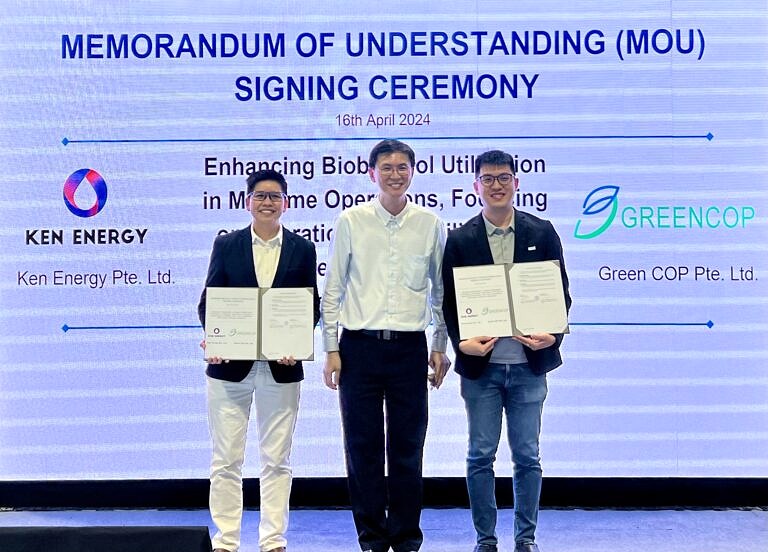Coastal Sustainability Alliance (CSA), an industry collaborative effort led by Kuok Maritime Group (KMG), has announced its plans to advance the maritime biofuel ecosystem in Singapore with up to S$10 million in investments. This partnership will be spearheaded by two of its Alliance members – Green COP and Ken Energy – which formalised a Memorandum of Understanding (MOU) at the Tech Stage (EXPO @SMW) at Singapore Maritime Week 2024.
Over the next two years, the CSA aims to develop stable B30, B40 and B50 biofuel blends and achieve production and commercial adoption of up to 50% (B50), derived from 50% agri-waste to Biobutanol – a blend poised to significantly reduce carbon emissions in maritime operations.
This process includes biofuel certification, commencing sea trials, building a production plant by 2025, and launching commercial-scale production by 2026. An initial S$500,000 angel investment has been secured for establishing a pilot plant for processing agri-waste, and over S$10 million is expected to be invested in scaling production capabilities.
“The formation of biofuel ecosystem under the Coastal Sustainability Alliance demonstrates our commitment to foster partnerships and deliver innovative sustainable maritime solutions for our conventional fleet owners as they progressively switch to lower emissions vessels,” Mr Tan Thai Yong, Managing Director, Strategic Projects and Technology, Kuok Maritime Group and Chairperson, CSA Council, said. “In bringing together Green COP and Ken Energy, we are laying the groundwork for a new biofuel supply chain and providing a viable alternative in the energy transition for the maritime sector.
“This initiative is more than an advancement in fuel technology as it exemplifies the power of collaboration, underscoring the CSA’s role as a steward and catalyst for positive change in the maritime industry.”
The CSA is actively driving maritime biofuel development to provide a viable biofuel alternative for vessels to reduce carbon emissions. The ecosystem will secure a ready supply of biofuel for local coastal demand and ensure the quality and stability of the biofuels with supply chain track and trace. This initiative also seeks to bolster Singapore’s standing in the Global Biofuels Alliance over the long term by building new R&D and innovation tracks in line with the nation’s environmental commitments.
Through this partnership, Ken Energy will play a pivotal role in strengthening the market and commercial utilisation of Biobutanol in maritime operations.
“We believe in the green transition that the maritime industry is embarking on,” Desmond Chong, Managing Director of Ken Energy, said. “This conviction underscores our strategic collaboration with Green COP. Leveraging our proficiency in marine transportation logistics alongside Green COP’s commendable sustainable biofuel production, we aim to spur the industry’s widespread adoption of biofuels.”
Green COP, with its proprietary technology, specialises in the efficient conversion of plant-based biowaste into sustainable biofuels through a patented pre-treatment and fermentation process. This innovative, cost-effective approach maximises resource utilisation and minimises waste generation, contributing to the circular economy and environmental sustainability.
“Green COP presents existing fleet owners with a coherent biofuel solution to achieve their net-zero targets in a progressive manner,” Dr Hanson Lee, CEO of Green COP, said. “We envision a future where Sustainable Marine Fuels (SMF), alongside coastal electrification, become the norm. The CSA has provided us access to market insights, industry collaborations and the necessary incubation for our growth. We look forward to working with more like-minded partners to spur biofuels research and adoption.”
Introducing the B50 blend represents a significant advancement in reducing carbon emissions within the maritime industry. For every metric ton (mt) of B50 fuel burned, carbon emissions are reduced to 1.5mt, a substantial improvement over the B30 blend. Additionally, the production of Biobutanol, a key component of the B50 blend, is more energy-efficient and yields a higher volume of fuel compared to traditional methods used for producing Fatty Acid Methyl Ester (FAME).
The CSA will continue to broaden the scope of the pioneering biofuel ecosystem and seek additional collaborations from stakeholders across the maritime and energy sectors to enhance technological, adoption and logistical capabilities.


